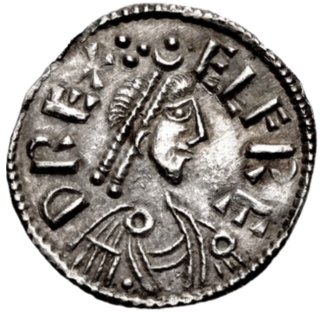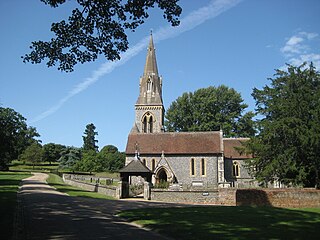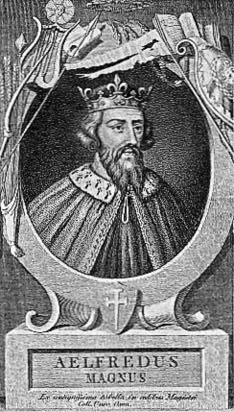
Alfred the Great was King of the West Saxons from 871 to 886, and King of the Anglo-Saxons from 886 until his death in 899. He was the youngest son of King Æthelwulf and his first wife Osburh, who both died when Alfred was young. Three of Alfred's brothers, Æthelbald, Æthelberht and Æthelred, reigned in turn before him. Under Alfred's rule, considerable administrative and military reforms were introduced, prompting lasting change in England.

The Kingdom of the West Saxons, also known as the Kingdom of Wessex, was an Anglo-Saxon kingdom in the south of Great Britain, from around 519 until England was unified.

Year 871 (DCCCLXXI) was a common year starting on Monday of the Julian calendar.

Æthelred I was King of Wessex from 865 until his death in 871. He was the fourth of five sons of King Æthelwulf of Wessex, four of whom in turn became king. Æthelred succeeded his elder brother Æthelberht and was followed by his youngest brother, Alfred the Great. Æthelred had two sons, Æthelhelm and Æthelwold, who were passed over for the kingship on their father's death because they were still infants. Alfred was succeeded by his son, Edward the Elder, and Æthelwold unsuccessfully disputed the throne with him.

Æthelwulf was King of Wessex from 839 to 858. In 825, his father, King Ecgberht, defeated King Beornwulf of Mercia, ending a long Mercian dominance over Anglo-Saxon England south of the Humber. Ecgberht sent Æthelwulf with an army to Kent, where he expelled the Mercian sub-king and was himself appointed sub-king. After 830, Ecgberht maintained good relations with Mercia, and this was continued by Æthelwulf when he became king in 839, the first son to succeed his father as West Saxon king since 641.

Æthelberht was the King of Wessex from 860 until his death in 865. He was the third son of King Æthelwulf by his first wife, Osburh. Æthelberht was first recorded as a witness to a charter in 854. The following year Æthelwulf went on pilgrimage to Rome and appointed his oldest surviving son, Æthelbald, as king of Wessex while Æthelberht became king of the recently conquered territory of Kent. Æthelberht may have surrendered his position to his father when he returned from pilgrimage, but resumed the south-eastern kingship when his father died in 858.

The Danelaw was the part of England in which the laws of the Danes held sway and dominated those of the Anglo-Saxons. The Danelaw contrasts with the West Saxon law and the Mercian law. The term is first recorded in the early 11th century as Dena lage. The areas that constituted the Danelaw lie in northern and eastern England, long occupied by Danes and other Norsemen.
Guthrum was King of East Anglia in the late 9th century. Originally a native of Denmark, he was one of the leaders of the "Great Summer Army" that arrived in Reading during April 871 to join forces with the Great Heathen Army, whose intentions were to conquer the kingdoms of Anglo-Saxon England. The combined armies were successful in conquering the kingdoms of East Anglia, Northumbria, and parts of Mercia, and overran Alfred the Great's Wessex, but were ultimately defeated by Alfred at the Battle of Edington in 878. The Danes retreated to their stronghold, where Alfred laid siege and eventually Guthrum surrendered.

At the Battle of Edington, an army of the kingdom of Wessex under Alfred the Great defeated the Great Heathen Army led by the Dane Guthrum on a date between 6 and 12 May 878, resulting in the Treaty of Wedmore later the same year. Primary sources locate the battle at "Eðandun". Until a scholarly consensus linked the battle site with the present-day village of Edington in Wiltshire, it was known as the Battle of Ethandun. This name continues to be used.

Æthelwold or Æthelwald was the younger of two known sons of Æthelred I, King of Wessex from 865 to 871. Æthelwold and his brother Æthelhelm were still infants when their father the king died while fighting a Danish Viking invasion. The throne passed to the king's younger brother Alfred the Great, who carried on the war against the Vikings and won a crucial victory at the Battle of Edington in 878.

Englefield is a village and civil parish in the English county of Berkshire. The village is mostly within the bounds of the private walled estate of Englefield House. The village is in the district of West Berkshire, close to Reading.

The Battle of Reading was a victory for a Danish Viking army over a West Saxon force on about 4 January 871 at Reading in Berkshire. The Vikings were led by Bagsecg and Halfdan Ragnarsson and the West Saxons by King Æthelred and his brother, the future King Alfred the Great. It was the second of a series of battles that took place following an invasion of Wessex by the Danish army in December 870.

The Great Heathen Army, also known as the Viking Great Army, was a coalition of Scandinavian warriors who invaded England in AD 865. Since the late 8th century, the Vikings had been engaging in raids on centres of wealth, such as monasteries. The Great Heathen Army was much larger and aimed to conquer and occupy the four kingdoms of East Anglia, Northumbria, Mercia and Wessex.

The Battle of Ashdown was a West Saxon victory over a Danish Viking army on about 8 January 871. The location of Ashdown is not known, but may be Kingstanding Hill in Berkshire. Other writers place the battle near Starveall, a short distance north of the village of Aldworth and south east of Lowbury Hill.

Bagsecg, also known as Bacgsecg, was a viking and a leader of the Great Army, which invaded England. According to the Anglo-Saxon Chronicle, Bagsecg and Healfdene were joint commanders of the Great Army that invaded the Kingdom of Wessex during the northern winter of 870/71.
Events from the 9th century in England.
The Battle of Basing was a victory of a Danish Viking army over the West Saxons at the royal estate of Basing in Hampshire on about 22 January 871.
Æthelwulf of Berkshire was a Saxon ealdorman. In 860 he and other men of Berkshire fought off a band of pirates near Winchester, Hampshire. Later he mustered a force of 1400 men against an army of Danes, won the 31 December 870 Battle of Englefield on behalf of the then kingdom of Wessex. He received a land grant in 843/44 from Brihtwulf, king of Mercia; and lost his life at the Battle of Reading.

Wulfhere was Ealdorman for Wiltshire, when the Anglo-Saxon kingdoms, of England, were experiencing turbulent times. An invading Danish army had landed in East Anglia, in 865 and had conquered all of the English kingdoms apart from Wessex. The Danish king Guthrum was overrunning the kingdom of Wessex, with Alfred the king of Wessex in retreat. The county of Wiltshire was part of Wessex and on its northern border was Danish held Mercia. Wulfhere was left with a problem, should he stay loyal to his king (Alfred) or do a deal with the invader? The evidence from the charters of the time infer that Wulfhere had some sort of arrangement with Guthrum. So when Alfred was able to regain control of his kingdom Wulfhere was held to account.
The Battle of Chippenham was a January 878 battle between a Viking army led by Guthrum and an Anglo-Saxon army led by Alfred the Great. The Vikings forced Alfred to flee Chippenham and managed temporarily to gain control over most of Wessex.













